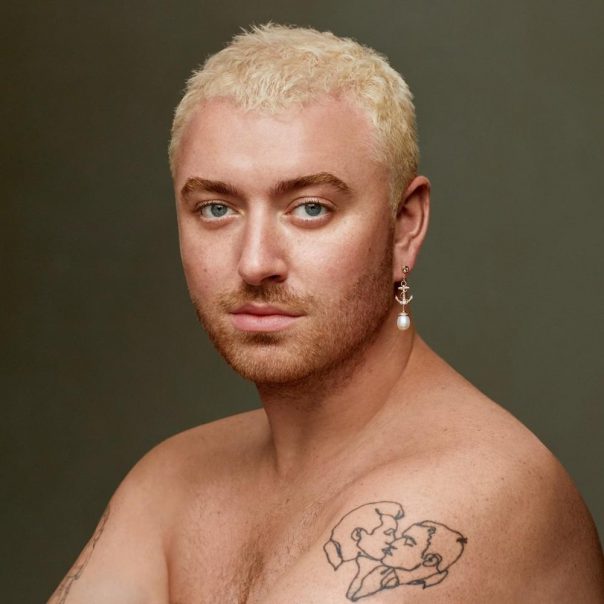ALBUM REVIEW: Sam Smith asserts their sexual identity on ‘Gloria’

Sam Smith, “Gloria.”
Imagine being a younger Sam Smith on the precipice of superstardom but having to censor yourself publicly and professionally for fear of losing not only everything you’d built for yourself, but also the respect of everyone else in the room. Even after becoming one of the biggest pop vocalists on the planet in the ensuing years, during which Smith first came out as gay and then nonbinary, they felt limited in what they could make and how they could express themself in studios full of men.
Gloria
Sam Smith
Capitol, Jan. 27
7/10
Get the album on Amazon Music.
So their new album Gloria, then, is a big F-off to those who’d been holding Smith back while at the same time being a proclamation of their true self, delivered in Smith’s signature molasses-smooth voice as they sing about their cup of love spilling over the brim. It’s a proud queer album, blending in historical accounts of the challenges the community often faces alongside out-and-proud proclamations, Smith’s personal hardships and plenty of thirst for good measure.
Following 2014’s In The Lonely Hour, 2017’s The Thrill Of It All and 2020’s Love Goes, it may be an unconventional time to make a coming of age album, yet that’s precisely how Smith has said they look at Gloria. But it makes sense when looking at it through this lens. While beautiful-sounding, poignant and bittersweet (a killer formula), those albums made it easy for listeners to think of how they related to them rather than to Sam Smith. With this one, Smith invites us into their life.
There’s nothing else on the album quite like “Unholy,” the tentpole collaboration with Kim Petras that deserves to win a Grammy next month. A lot has been said about this absolute banger, but it’s important to point out that the pressure that’s followed Smith throughout their career existed even during the creation of this song. It was Smith, Petras and nine men in the room, and all of them were ignoring them. It was only after Smith demanded they stop talking and insisted that Petras knew what she was doing that did she freestyle her sticky verse.
Smith went on to surround themself with female voices while making Gloria to “balance” the tone of the album and make it more feminine. Besides Petras, the album features soul singer and rapper Jessie Reyez and Jamaican artist Koffee. Cowriter Reyez joins Smith on the sleek, bass-heavy mood-setter “Perfect,” which celebrates imperfection and sexy guitar solos. Both Reyez and Koffee pop up on the album’s second-most interesting banger, “Gimme.” The double-entendre-filled dancehall tune is all about desire.
While these songs and Kylie-Minogue-esque dance floor thumper “Lose You” are the primal beast on Gloria, Smith’s heart opens wider on the slower material, which more closely hews to their previous work. On album opener “Love Me More,” Sam Smith pledges to love themself more than they have in the past, and to stop looking looking in the mirror, which “isn’t good for your health.”
“I used to cry myself to sleep at night/ I’d blame the sky when the mess was in my mind/ I couldn’t see, I couldn’t breathe/ So I sat with sorrow/ And eventually, it set me free,” Smith sings, occasionally joined by a choir of voices.
Album closer “Who We Love” is a piano ballad and the most emphatic empowerment on the album. The song actually came from the mind of Ed Sheeran, who duets with Smith.
“It’s not wrong/ To want the world for someone/ It’s not a feeling you can run from/ ‘Cause we love who we love,” Smith sings, joined by a harmonizing Sheeran on the second go-around of the chorus.
“No God” and “How To Cry” are most like Smith’s older break-up anthems. The former is less clear but plays like a rebuke of someone unworthy of the pedestal on which they sit. There’s more rebuking going on on the tender latter song, which has a lot to unpack on an ending relationship where the other person isn’t able to convey what’s going on in their mind. The acoustic-guitar-led ballad also includes a probably accidental parallel reference to “Hamilton:” “You’ve never been satisfied.”
Sam Smith has described R&B-tinged “Six Shots” as their “sex song.” Sonically it shares a similar base as “Perfect,” though lyrically it’s more like “Gimme,” which immediately follows it. The other bold statement comes on bopping mid-’80s-sounding tune “I’m Not Here To Make Friends” (written with Stargate and Reyez and produced by Calvin Harris)—because Smith is actually after a lover.
There are two short interludes on Gloria—neither one breaking 18 seconds—that effectively add to the story of the album and push the narrative forward. “Hurting Interlude” is an excerpt from a news reporter covering New York’s first Pride celebration. Set alongside symphonic strings it quickly explains how alone being non-heteronormative can feel. “Dorothy’s Interlude” feels like you’re turning the dial on a radio filled with important moments for the LGBTQIA community. Within eight seconds it covers snippets of drag queen Divine in John Waters film Pink Flamingos, Judy Garland singing “Somewhere Over The Rainbow,” trans activist Sylvia Rivera’s speech at a 1973 gay liberation rally and the 1991 ballroom culture documentary Paris Is Burning.
The other narrative standout on the album is the title track, a choir hymn that’s possibly the most unique song Sam Smith has ever written (with Foy Vance). On top of that, Smith recorded the song with a choir at the majestic church they attended as a child. It’s not a hymn in the traditional sense, though the “Gloria” they’re addressing, an “enigmatic life force,” might as well be God.
Follow editor Roman Gokhman at Twitter.com/RomiTheWriter.
